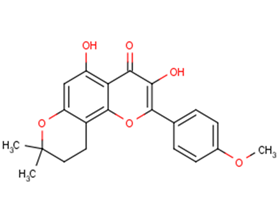
Anhydroicaritin
CAS No. 38226-86-7
Anhydroicaritin( —— )
Catalog No. M18495 CAS No. 38226-86-7
Anhydroicaritin exhibits immunosuppressive effect on the mouse macrophages stimulated by LPS.
Purity : >98% (HPLC)
 COA
COA
 Datasheet
Datasheet
 HNMR
HNMR
 HPLC
HPLC
 MSDS
MSDS
 Handing Instructions
Handing Instructions
| Size | Price / USD | Stock | Quantity |
| 5MG | 42 | In Stock |


|
| 10MG | 72 | In Stock |


|
| 25MG | 138 | In Stock |


|
| 50MG | 205 | In Stock |


|
| 100MG | 318 | In Stock |


|
| 200MG | Get Quote | In Stock |


|
| 500MG | Get Quote | In Stock |


|
| 1G | Get Quote | In Stock |


|
Biological Information
-
Product NameAnhydroicaritin
-
NoteResearch use only, not for human use.
-
Brief DescriptionAnhydroicaritin exhibits immunosuppressive effect on the mouse macrophages stimulated by LPS.
-
DescriptionAnhydroicaritin exhibits immunosuppressive effect on the mouse macrophages stimulated by LPS. Anhydroicaritin phytosomes can inhibit enhanced bone turnover induced by ovariectomy, improve BMD the biomechanical properties of vertebrae, without any stimulation on uterus. Anhydroicaritin possesses significant protective effects on the zymosan-induced peritonitis mice, which might be associated with the regulation of Ca(2+); influx in macrophages and iNOS expression.
-
In Vitro——
-
In Vivo——
-
Synonyms——
-
PathwayOthers
-
TargetOther Targets
-
RecptorOthers
-
Research Area——
-
Indication——
Chemical Information
-
CAS Number38226-86-7
-
Formula Weight368.38
-
Molecular FormulaC21H20O6
-
Purity>98% (HPLC)
-
SolubilityIn Vitro:?DMSO : 8.33 mg/mL (22.61 mM)
-
SMILESCC1(CCC2=C3C(=C(C=C2O1)O)C(=O)C(=C(O3)C4=CC=C(C=C4)OC)O)C
-
Chemical Name——
Shipping & Storage Information
-
Storage(-20℃)
-
ShippingWith Ice Pack
-
Stability≥ 2 years
Reference
molnova catalog



related products
-
Auranofin
Auranofin is an antirheumatic agent, is used to treat rheumatoid arthritis.
-
CCG-63802
CCG-63802 is a reversible small-molecule inhibitor of regulator of G protein signaling (RGS) proteins.
-
TPCK
TPCK is an irreversible inhibitor of chymotrypsin-like proteases that affect cell proliferation apoptosis and tumorigenesis.



 Cart
Cart
 sales@molnova.com
sales@molnova.com


